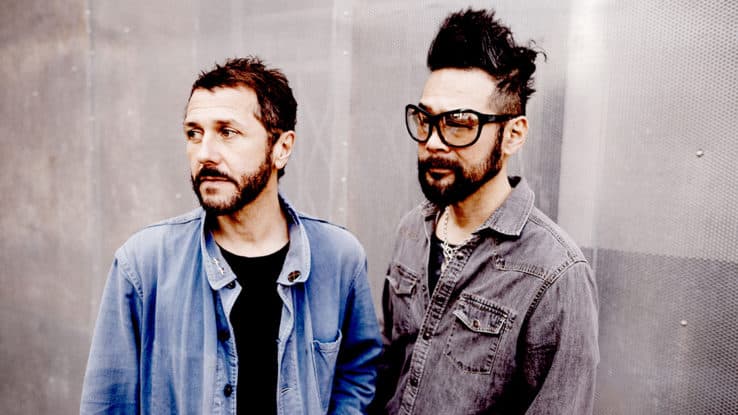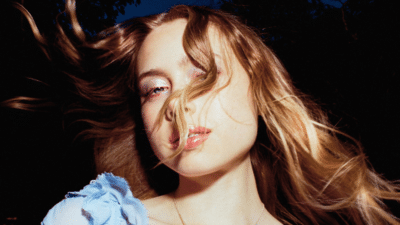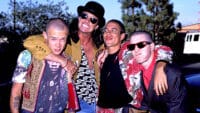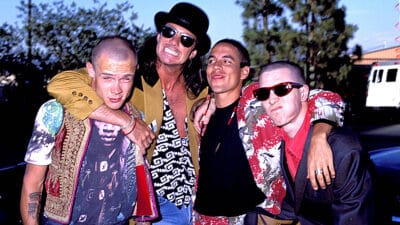Music

Interview
First Stages: Feeder
Feeder frontman Grant Nicholas looks back on the band’s early days ahead of a new album, a new summer tour and whole new outlook on life
Grant Nicholas thinks we’re gonna make it. Still buzzing with the same energy that has kept Feeder topping charts and festival line-ups for almost 30 years, Nicholas is staring down Covid, environmental destruction and the eve of WWIII with a sunny sense of optimism.
“I think everyone wants a bit of positivity at the moment,” he laughs, tipping back an easy chair in a bright and cheery garden room. “I’m excited about the future. I’m probably more inspired and driven now than when we first started. The last few years have been tough for everyone but right now I just want to get back to making music and having fun.”
Exploding out of late 90s with pop punk kicks and stadium-sized riffs, Feeder crashed through a sea of a Britpop imitators to help define the sound of the new century – topping the charts with alt-rock anthems like ‘Buck Rogers’, ‘Just A Day’ and ‘Just The Way I’m Feeling’. Sharing the stage with Taka Hirose since 1994, Nicholas has co-fronted Feeder through three decades and 10 albums – now getting ready to release the band’s 11th studio record, Torpedo, in March, ahead of a major UK spring and summer tour.
First though, Feeder are heading back to their roots as they join the Music Venue Trust (MVT) on their Revive Live Tour, designed to support the small grassroots venues across the UK that have all struggled during the pandemic. As the band prepare to blow the roof off Queens Hall in Narberth and Percy’s Café Bar in Whitchurch on March 11 and 12, Nicholas spent time chatting about Feeder’s first steps, the band’s massive new album and why he’s never felt so excited about what lies ahead.
Your last album [Talluah] was your biggest record for 14 years, but the pandemic hit right in the middle of your tour. It must have been so frustrating to have to put the brakes on after hitting such a high?
Yeah, we were really in the zone when it hit. We were playing well, we were really connecting with the music, the audiences were great… And obviously, the album was really well received. So yeah, it was frustrating, but obviously it was a weird time for everyone. And that was just the start of it too.
You were one of the first bands to get back on a festival stage last summer though – what did it feel like getting out in front of audiences again?
It was… bizarre. Honestly, it was actually quite nerve wracking too. You never quite know what to expect from festival crowds. It doesn’t matter how successful you’ve been as a band – sometimes festival gigs go really well, and sometimes they just don’t connect in the way you want them to. I would have much rather just done a small venue somewhere, just to sort of get used to being back on stage again, but it actually went really well. As soon as we walked out I instantly felt comfortable, which is often the way actually. I tend to get a little bit twitchy before gigs, but as soon as I start playing I’m fine, I’m in my zone. But an hour before the gig I’m pacing up and down the dressing room.
And that’s still the same for you after all these years?
Yeah, I mean, I think when you’re singing as well as playing there’s always a bit more pressure. You never know how you’re gonna feel on the night. The sets have gotten longer as we’ve made more records and, you know, your body changes with age a little bit as well. We always put on the best show we possibly can, but we just have to sort of set the focus and pace a little bit more. I think in some ways I’ve sort of learned to manage that better as I’ve gotten older actually. In my younger days I’d have a half hour set and I’d just scream my head off and not be able to speak the next day… Now that I’m singing for two hours at a time I have to look after myself a little bit more.
You wrote the new album in lockdown. The best rock and punk often comes from a place of frustration, so did you find it easy to tap into those emotions for some of the angrier tracks on Torpedo?
I think so, yeah [laughs]. This record was written at a difficult time for everybody, me included. In the first lockdown I didn’t feel overly inspired for the first time in quite a while, but as it went on I did maybe feed off some of that frustration. It maybe brought back a bit more of the old-school Feeder sound into a few songs. But looking back on it now I think I wasn’t really that aware of it at the time. I wasn’t trying to write “our Covid album”. Frustration can go for lots of things in life, you know? It can be relationship stuff, family stuff, mental health, everything, and I hope the songs are quite universal in that way. I just try and write songs that I feel somebody else out there will connect with, and that never gets any easier. You can have the simplest lyrics that really resonate with people and then you try and be really clever and arty and no one seems to get it… There’s a real art to it, and it’s something that I’m always learning.
There’s a lot of optimism in the record too, especially on the opening track, ‘The Healing’. That’s all too rare in rock – especially given the circumstances you were writing it in.
‘The Healing’ is a really weird song because it came out at such a perfect time, although I never planned it like that. I wanted to make it a journey that took people through lots of things that had been happening in the past few years, from climate change to the wildfires in California. I’m not trying to preach, but that song really came from how those things affected me. The original version was almost seven minutes long because I was going through this rock opera thing in my head… [laughs] I know that sounds a bit prog but I kind of wanted that. But the great thing about ‘The Healing’ is that it still works chopped into a shorter song for the single, and then it leaves room for something bigger in the full album version. They’ve been playing the longer video edit on the radio though, and I don’t think we’ve ever had anything that long played on the radio before throughout our whole career!
How excited are you to play these new tracks live this year?
We had a track on the last album called ‘Kyoto’ that felt like a like proper old-school Feeder track, and we loved playing that song live. It wasn’t a single but it felt like a real standout moment in the set, and it feels like a lot of Torpedo might fit that shape. I just think the timing is right for this record. You know, sometimes we have the right album at the right time. And sometimes it hasn’t really been the right climate for rock, and you can’t ever second guess that. This is definitely a rock album though. There are some mellow moments on it, but that’s what Feeder does and that’s who we are – we’ll have a heavy song and we’ll have an acoustic song with strings on it right next to it. But for live… you never quite know until you actually get out there, but yeah, I’m really looking forward to it. I think it’s gonna be a really fun tour.
You’re playing a couple of small venues in Wales and Shropshire for the MVT tour – do you remember what it felt like regularly playing stages of that size? Do you remember your first gig?
We played the most random places when we were starting out because at that time we would literally play anywhere. We started building up a following in London, but we went all over the country. Those early years were where we learned our trade as a band, so a lot of those London venues were so important to us. Places like The Dublin Castle, Bull And Gate, The [Camden] Falcon. The Borderline was a really important place for us too as a lot of record companies used to come there. There was there was The Monarch… The Splash Club, that then changed its name to Barfly. And I’m talking about the original one that was in Kings Cross at The Water Rats pub, right? That was one of the most important venues in London, because everyone played there and it was a really vibey gig. That’s where we went from playing to 10 people to selling it out. I think that’s where people started to notice Feeder.
What was that jump like when you started selling out venues for the first time?
It was tough. The Britpop thing was going on at the time and we didn’t necessarily fit into that. So we were often sort of lumped in with the American thing that was happening with the late grunge scene, but we still felt too British for that really. So we were kind of mid-Atlantic, I suppose. But we managed to build up a great following and then as things got a little bit bigger we did The Electric Ballroom and Coco. So that felt like a really big step from those small gigs. I mean, we once played a place called The Roadhouse in Covent Garden, and that doubled as a restaurant… We’d be rocking out on stage in front of about five people eating burgers…
Do you miss anything from that time though? Apart from the restaurant crowd…
Yeah, I mean, it was good fun. We carried our amps in, tuned up our guitars and just went for it, you know? The sets were probably a maximum of 20 minutes, first on the bill, and then you’d slowly move your way up to second and third. It was a real process, and you could feel it gradually building. I think that’s so important for any band, just because it’s where you get that confidence to be on stage. It’s when you find your identity. I can’t stress the importance of grassroots venues because we literally wouldn’t be here without them. It was our apprenticeship.
How do you feel about some of the modern bands who find fame a lot faster now, either through reality shows or social media? Are they missing out on that formative experience?
I feel a bit uncomfortable with some of it. There are some really talented people out there, and I don’t blame anyone for trying to find success. It is a business, and it is a really tough industry. It always has been, and I think now it’s probably more difficult in some ways. But, on the other hand, everyone thinks they can be a rockstar now and there’s a bit more to it just having a good voice and going on a TV show. I genuinely think that the only reason I was ever able to walk out on a festival stage is because I’d had that experience of playing so many small gigs before.
Let’s skip forward to that moment then, when you did walk out on a festival stage for the first time. Do you remember that feeling?
It wasn’t a sudden thing, because we definitely didn’t have that overnight corporate success thing. It was a very gradual climb, and it still kind of feels like that little bit now in some ways. But I remember the first time we did the mainstage at Reading and that definitely felt like a bit of a jump! It was a different level. But we were ready, you know? Well, you know, whatever ready means.
Does any of that feel surreal, looking back now?
The thing is, I didn’t ever want to be a lead singer in a band. I wanted to play guitar, and maybe do some backing vocals and, you know, just kind of rock out and write songs. I ended up singing because it’s part of being a songwriter, and that’s been incredibly useful to me. When people came up to me and said, ‘oh you’re the singer in Feeder’ it felt a bit weird to me. It still does. But I think the past few years have given me time to step back and say ‘this is what we do… Let’s just do this. Let’s have fun and do it to the best of our ability.’ I love writing music, and it’s something I can’t stop doing. I genuinely do feel lucky in that way, and I’ve just been writing so much stuff. Honestly, it’s pouring out of me, so I’m just making the most of it right now. That’s why I’m really looking forward to the gigs this summer I think. It’s gonna be fun. It’s gonna be chaos. I’ve missed it…
Feeder are playing two dates for the Revive Live Tour on March 10 and 11, followed by a string of arena dates throughout April and May. Tickets are available here.









